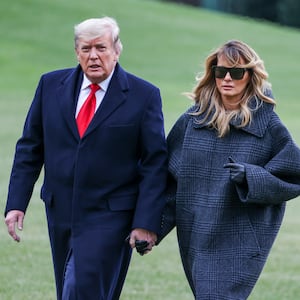A local criminal investigation into then-President Donald Trump’s attempt to meddle with Georgia’s 2020 election recount is inching forward, as Fulton County investigators have interviewed elections officials and received documents from the agency, according to three people with direct knowledge of the probe.
“They’ve asked us for documents, they’ve talked to some of our folks, and we’ll cooperate fully,” Georgia Secretary of State Brad Raffensperger told The Daily Beast this week.
Fulton County District Attorney Fani Willis previously revealed to The Daily Beast that she has spun up a new anti-corruption team to explore what state laws, if any, were broken when Trump and his allies tried to overturn election results there. But her office has been quiet about the matter in the five months since.
Her investigators have since interviewed at least four officials at the secretary of state’s office, asking questions that show a particular interest in Raffensperger’s separate phone conversations with Trump and U.S. Senator Lindsey Graham, according to two of these sources, who spoke on the condition of anonymity.
Late last year, Raffensperger told The Washington Post that Graham called him a week after the hotly contested November election, asking if the state official could exercise his power to toss out mailed-in ballots in counties that had high rates of signatures that didn’t match those on file. Graham has since denied that he tried to get Raffensperger to dump legal ballots.
Then there’s the Jan. 2 shakedown call between the White House and Raffensperger’s office. On that call—which was recorded and immediately leaked to The Washington Post—Trump pressured Raffensperger to “find 11,780 votes” that didn’t exist in order to erase Joe Biden’s lead and flip the election results. Raffensperger was on the call with his deputy secretary of state, Jordan Fuchs, and his agency’s top attorney, Ryan Germany. Trump also had several advisers on the call, including White House Chief of Staff Mark Meadows and Cleta Mitchell, a star in the conservative legal community.
As of Friday evening, Trump’s lawyers and spokeswoman did not provide comment for this story. Graham and Rudy Giuliani, a former top Trump attorney, also could not be reached for comment. On Friday, Mitchell, who played a prominent role in Trump’s pressure campaign on Georgia, did not have anything to say about the recent developments in the criminal investigation.
Asked if investigators had made any effort to reach out to her in their ongoing probe, Mitchell simply said, “I don’t discuss that.”
According to two sources, DA investigators interviewed a number of people around May who could have been influenced by the former president’s plea to find votes, including Germany, agency communications director Ari Schaffer, chief operating officer Gabriel Sterling, and the external affairs director who oversees the agency’s outreach programs, Sam Teasley.
Germany is heard on the recorded call making a notable stand against Trump’s conspiracy theories when he said, “That’s not accurate, Mr. President.” Schaffer worked as a White House researcher in the first year and a half of the Trump administration. And Sterling briefly rose to national prominence last year when he delivered an exasperated speech to news reporters from a podium at the state Capitol demanding that the conspiracy-fueled threat of violence “has to stop.”
“Mr. President, you have not condemned these actions or this language,” Sterling said at the time.
DA investigators asked general questions “about the Graham call, about the Trump call, about how things work at the office,” recalled one person who was present during an interview.
“They genuinely wanted to understand: If you’re trying to influence, what were you trying to influence, and how would it have worked?” that person said.
Another person with knowledge of the probe said they had indications that much of the investigation is done. “They’ve interviewed all the people that they wanted, then they got the documents that they wanted,” this person said
The DA’s office declined to confirm any details about the secretary of state’s cooperation with the investigation. And Deputy District Attorney Jeff DiSantis would only say that the investigation “is ongoing.”
The fact that the phone call, and other aspects of Trump’s and the Republicans’ pressure campaign, would trigger the launch of a criminal investigation did not come as a huge surprise to many political observers—including several of those who once occupied senior posts in the Trump White House and on the 2020 re-election campaign.
According to two former top Trump aides, there were explicit attempts among high-level officials, such as Trump campaign manager Bill Stepien, to wall themselves off from much of what Giuliani, Trump, and members of “Team Rudy” were doing during that tumultuous, and eventually violent presidential transition.
Some in the administration and on the campaign were deeply embarrassed by it. Some predicted—likely accurately—that there would be potential legal exposure for themselves if they got too close to what Giuliani and others were doing.
“I did everything short of sticking my fingers in my ears when someone would say, ‘Hey, you hear what Rudy’s been doing today?’” one of the president’s ex-aides told The Daily Beast.
There were some instances when many of these top Trump officials claim they learned about what Trump, Giuliani, and other election-deadenders were privately up to or plotting—only after reading about it in the press. The two former senior Trump aides said the reason they found out about the Jan. 2 call was simply because the Post publicly reported on it.
Observers have noted that this Fulton County investigation out of Atlanta is proceeding slowly. Earlier this summer, Insider noted that Willis is struggling to dedicate adequate resources to investigate the former president, because her office faces a growing crime wave and is trudging through “a historic backlog of 12,000 cases” she inherited from her predecessor.
The effort to potentially indict Trump faces a steep uphill climb, and not only because it is still unprecedented for a local prosecutor to pursue a criminal case against a former president. Willis, who is still in her first year in office, is operating with county funds that seem rather slim compared to the war chest that Trump has amassed from loyalists. The latest numbers show that Trump’s political groups have collected $100 million so far this year, according to The New York Times. That’s four times the entire Fulton County DA’s latest annual proposed budget.
In an effort that may turn out to be more fruitful, prosecutors appear to be building an easier case against Giuliani, who took a weeks-long post-election road trip through battleground states to cast doubt on ballot results in Arizona, Georgia, Michigan, and Pennsylvania.
As The Daily Beast has previously reported, prosecutors are eyeing “false statement” charges against Giuliani, who acted on Trump’s behalf when he spoke before Georgia’s state Senate Judiciary Subcommittee on Dec. 3, 2020 and detailed his rigged election conspiracy. Giuliani lied that the state counted 96,600 “phantom votes,” repeating the same bonkers claim that fueled Sidney Powell’s so-called “Kraken” lawsuit—which was promptly tossed out by a federal judge.
Giuliani also presented fake evidence of voting machine flaws and “mystery ballot boxes.” And he repeated the claims a week later on Dec. 10 before the state’s House Governmental Affairs Committee.










